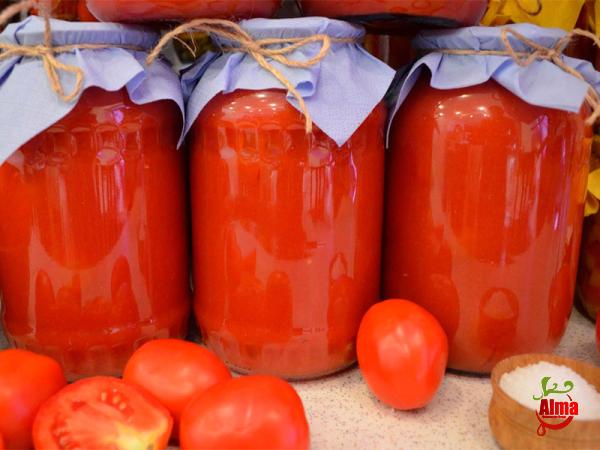The Versatile and Convenient Choice: A Brief Summary of Canned Diced Tomatoes Introduction: Canned diced tomatoes have become a staple in today’s culinary world, offering convenience, versatility, and unparalleled taste. Used in a variety of dishes from pasta sauces and soups to salsas and stews, canned diced tomatoes serve as a reliable and accessible ingredient for both professional chefs and home cooks. In this summary, we will explore why canned diced tomatoes are a popular choice, discussing their benefits, various uses, and potential downsides. Benefits of Canned Diced Tomatoes: 1. Convenience: Canned diced tomatoes offer a convenient solution for those who do not have the time or resources to prepare fresh tomatoes. They are readily available year-round and eliminate the need for peeling, chopping, and deseeding. By simply opening a can, you have access to perfectly diced tomatoes. 2. Extended Shelf Life: One of the significant advantages of canned diced tomatoes is their extended shelf life compared to fresh tomatoes. This feature allows for easy storage and utilization without concerns of spoilage or waste. Canned tomatoes can be safely stored for an extended period, making them an ideal pantry staple for various recipes. 3. Nutritional Value: Contrary to popular belief, the nutritional value of canned diced tomatoes is comparable to fresh tomatoes. The canning process helps retain key nutrients such as vitamins A, C, and K, as well as lycopene—an antioxidant associated with numerous health benefits. Canned diced tomatoes are an excellent alternative when fresh produce is out of season or not easily accessible. Versatile Uses of Canned Diced Tomatoes: 1. Pasta Sauces and Soups: Canned diced tomatoes are a key ingredient in countless pasta dishes and soups, adding depth, flavor, and a delightful texture. Whether it’s marinara sauce, bolognese, or a simple tomato soup, diced tomatoes provide a strong base and a rich tomato flavor.

tomato paste
 2. Salsas and Dips: The chunky texture of canned diced tomatoes makes them an ideal choice for salsas and dips. They bring a fresh burst of flavor and juiciness, transforming any snack or appetizer into a satisfying treat. From classic tomato salsa to guacamole, diced tomatoes add both depth and color. 3. Stews and Casseroles: In heartier meals like stews, casseroles, and chili, canned diced tomatoes contribute to the overall richness of the dish. The combination of tomatoes’ natural acidity and sweetness harmonizes with other ingredients, creating a well-rounded flavor profile that enhances the overall dining experience. 4. Pizza Toppings and Bruschetta: For pizza enthusiasts, canned diced tomatoes offer a simple and effective way to achieve an authentic tomato topping. When cooked with a handful of spices and herbs, the diced tomatoes blend harmoniously with cheese and other toppings, creating a burst of flavors. Similarly, for a quick bruschetta topping, canned diced tomatoes provide a delightful balance to the toasted bread. Factors to Consider: 1. Added Ingredients and Sodium Content: Although canned diced tomatoes are generally considered healthy, it is essential to be mindful of added ingredients and sodium content. Some brands may include preservatives, sugar, or excessive amounts of salt. It is, therefore, wise to opt for brands with no added salt or to drain and rinse the tomatoes before use to reduce sodium levels.
2. Salsas and Dips: The chunky texture of canned diced tomatoes makes them an ideal choice for salsas and dips. They bring a fresh burst of flavor and juiciness, transforming any snack or appetizer into a satisfying treat. From classic tomato salsa to guacamole, diced tomatoes add both depth and color. 3. Stews and Casseroles: In heartier meals like stews, casseroles, and chili, canned diced tomatoes contribute to the overall richness of the dish. The combination of tomatoes’ natural acidity and sweetness harmonizes with other ingredients, creating a well-rounded flavor profile that enhances the overall dining experience. 4. Pizza Toppings and Bruschetta: For pizza enthusiasts, canned diced tomatoes offer a simple and effective way to achieve an authentic tomato topping. When cooked with a handful of spices and herbs, the diced tomatoes blend harmoniously with cheese and other toppings, creating a burst of flavors. Similarly, for a quick bruschetta topping, canned diced tomatoes provide a delightful balance to the toasted bread. Factors to Consider: 1. Added Ingredients and Sodium Content: Although canned diced tomatoes are generally considered healthy, it is essential to be mindful of added ingredients and sodium content. Some brands may include preservatives, sugar, or excessive amounts of salt. It is, therefore, wise to opt for brands with no added salt or to drain and rinse the tomatoes before use to reduce sodium levels.
Specifications of tomato paste
 2. Consistency: The consistency of canned diced tomatoes varies among brands, with some providing chunkier pieces while others offer a smoother texture. Depending on the desired outcome, it may be necessary to experiment with different brands to find the right consistency for specific recipes. Conclusion: Canned diced tomatoes have revolutionized the way we cook and enjoy tomato-based dishes. Their convenient availability, extended shelf life, and nutritional value make them an invaluable ingredient in many kitchens. Whether used in pasta sauces, soups, salsas, or stews, canned diced tomatoes contribute vibrant flavors and versatile textures. While considering factors such as added ingredients and consistency, their benefits outweigh any downsides, making canned diced tomatoes an essential pantry staple for both professional chefs and home cooks alike.Title: The Versatile and Convenient Choice: A Comprehensive Guide to Canned Diced Tomatoes 1. A Brief Overview of Canned Diced Tomatoes: Canned diced tomatoes are a popular ingredient in the culinary world due to their convenience, extended shelf life, and nutritional value. These tomatoes are peeled, chopped, and packed in a can with their juices, preserving their flavor and texture. They offer a reliable option for individuals who may not have access to fresh tomatoes, are short on time, or simply prefer the convenience of ready-to-use ingredients. 2. The Appeal of Canned Diced Tomatoes in the Food Industry: In the food industry, canned diced tomatoes have gained recognition for their consistency and reliability. Restaurants and catering businesses rely on the convenience and quality of canned diced tomatoes to ensure that their dishes taste the same every time. Moreover, the extended shelf life of these tomatoes allows for streamlined inventory management and eliminates the risk of sudden ingredient shortages. 3. Demand and Market Trends: The market demand for canned diced tomatoes has been steadily growing. The increasing popularity of international cuisines, such as Italian, Mexican, and Spanish, has contributed to the higher demand for this versatile ingredient. Additionally, the demand for convenient and time-saving solutions in the kitchen has further fueled the growth of the canned food industry, including diced tomatoes. 4. Health Benefits and Nutritional Value: Canned diced tomatoes retain their nutritional value during the canning process. They are an excellent source of vitamins A, C, and K, as well as potassium and fiber. Additionally, the lycopene content in tomatoes has been associated with various health benefits, including a reduced risk of certain cancers and cardiovascular diseases. Canned diced tomatoes offer a convenient and accessible way to incorporate these health benefits into everyday cooking. 5. Considerations for Consumers: When purchasing canned diced tomatoes, consumers should be mindful of certain factors. It is essential to read the label and choose products that do not contain added preservatives, excessive sodium, or added sugars. Opting for organic or low-sodium options can help meet specific dietary or health requirements. Consumers should also check the expiration date to ensure the freshness and quality of the product. 6. Brand Differentiation: Various brands offer canned diced tomatoes, each with its own unique qualities. Some brands may use specific tomato varieties known for their robust flavor, while others may focus on using tomatoes harvested at the peak of ripeness for optimal taste. Exploring different brands and experimenting with their flavor profiles can enhance the overall culinary experience.
2. Consistency: The consistency of canned diced tomatoes varies among brands, with some providing chunkier pieces while others offer a smoother texture. Depending on the desired outcome, it may be necessary to experiment with different brands to find the right consistency for specific recipes. Conclusion: Canned diced tomatoes have revolutionized the way we cook and enjoy tomato-based dishes. Their convenient availability, extended shelf life, and nutritional value make them an invaluable ingredient in many kitchens. Whether used in pasta sauces, soups, salsas, or stews, canned diced tomatoes contribute vibrant flavors and versatile textures. While considering factors such as added ingredients and consistency, their benefits outweigh any downsides, making canned diced tomatoes an essential pantry staple for both professional chefs and home cooks alike.Title: The Versatile and Convenient Choice: A Comprehensive Guide to Canned Diced Tomatoes 1. A Brief Overview of Canned Diced Tomatoes: Canned diced tomatoes are a popular ingredient in the culinary world due to their convenience, extended shelf life, and nutritional value. These tomatoes are peeled, chopped, and packed in a can with their juices, preserving their flavor and texture. They offer a reliable option for individuals who may not have access to fresh tomatoes, are short on time, or simply prefer the convenience of ready-to-use ingredients. 2. The Appeal of Canned Diced Tomatoes in the Food Industry: In the food industry, canned diced tomatoes have gained recognition for their consistency and reliability. Restaurants and catering businesses rely on the convenience and quality of canned diced tomatoes to ensure that their dishes taste the same every time. Moreover, the extended shelf life of these tomatoes allows for streamlined inventory management and eliminates the risk of sudden ingredient shortages. 3. Demand and Market Trends: The market demand for canned diced tomatoes has been steadily growing. The increasing popularity of international cuisines, such as Italian, Mexican, and Spanish, has contributed to the higher demand for this versatile ingredient. Additionally, the demand for convenient and time-saving solutions in the kitchen has further fueled the growth of the canned food industry, including diced tomatoes. 4. Health Benefits and Nutritional Value: Canned diced tomatoes retain their nutritional value during the canning process. They are an excellent source of vitamins A, C, and K, as well as potassium and fiber. Additionally, the lycopene content in tomatoes has been associated with various health benefits, including a reduced risk of certain cancers and cardiovascular diseases. Canned diced tomatoes offer a convenient and accessible way to incorporate these health benefits into everyday cooking. 5. Considerations for Consumers: When purchasing canned diced tomatoes, consumers should be mindful of certain factors. It is essential to read the label and choose products that do not contain added preservatives, excessive sodium, or added sugars. Opting for organic or low-sodium options can help meet specific dietary or health requirements. Consumers should also check the expiration date to ensure the freshness and quality of the product. 6. Brand Differentiation: Various brands offer canned diced tomatoes, each with its own unique qualities. Some brands may use specific tomato varieties known for their robust flavor, while others may focus on using tomatoes harvested at the peak of ripeness for optimal taste. Exploring different brands and experimenting with their flavor profiles can enhance the overall culinary experience.
buy tomato paste
 7. Culinary Tips and Recipe Ideas: Canned diced tomatoes are incredibly versatile and can be used in a wide range of recipes. They serve as an excellent base for pasta sauces, imparting a rich tomato flavor and a vibrant color. They also work well in soups, providing depth and tanginess. For those who enjoy a touch of heat, diced tomatoes can be used in salsas and spicy dishes, adding a refreshing contrast to the spiciness. 8. Packaging Options: Canned diced tomatoes are available in various packaging options, including can sizes and materials. Large cans are suitable for bulk usage in commercial kitchens, while smaller cans are convenient for households and individual servings. Some manufacturers offer BPA-free cans, addressing consumers’ concerns about chemical exposure. Checking packaging options can help consumers make an informed choice based on their needs and preferences. 9. Sustainability and Environmental Considerations: The canned food industry has made strides in reducing its environmental impact. Many manufacturers prioritize sustainability, using recycled materials and implementing eco-friendly practices in their production processes. Additionally, the extended shelf life of canned diced tomatoes helps prevent food waste, reducing the carbon footprint associated with food production. 10. Tips for Storing and Using Canned Diced Tomatoes: To maximize the shelf life and flavor of canned diced tomatoes, it is recommended to store them in a cool, dark place away from direct sunlight. Once opened, unused portions can be stored in airtight containers in the refrigerator for up to five days. Additionally, drained canned tomatoes can be frozen for longer storage. To enhance the flavor, herbs and spices can be added during cooking to customize the taste according to personal preferences. Conclusion: Canned diced tomatoes have become an indispensable ingredient in kitchens around the world, offering convenience, versatility, and exceptional taste. Whether used in sauces, soups, salsas, or stews, they provide a burst of flavor and texture that enhances various dishes. With careful consideration of factors such as nutritional value, added ingredients, and packaging options, consumers can fully enjoy the benefits of using canned diced tomatoes in their culinary pursuits. As the demand for quick and convenient meal solutions continues to grow, canned diced tomatoes will undoubtedly remain a trusted and accessible choice for both professional chefs and home cooks alike.
7. Culinary Tips and Recipe Ideas: Canned diced tomatoes are incredibly versatile and can be used in a wide range of recipes. They serve as an excellent base for pasta sauces, imparting a rich tomato flavor and a vibrant color. They also work well in soups, providing depth and tanginess. For those who enjoy a touch of heat, diced tomatoes can be used in salsas and spicy dishes, adding a refreshing contrast to the spiciness. 8. Packaging Options: Canned diced tomatoes are available in various packaging options, including can sizes and materials. Large cans are suitable for bulk usage in commercial kitchens, while smaller cans are convenient for households and individual servings. Some manufacturers offer BPA-free cans, addressing consumers’ concerns about chemical exposure. Checking packaging options can help consumers make an informed choice based on their needs and preferences. 9. Sustainability and Environmental Considerations: The canned food industry has made strides in reducing its environmental impact. Many manufacturers prioritize sustainability, using recycled materials and implementing eco-friendly practices in their production processes. Additionally, the extended shelf life of canned diced tomatoes helps prevent food waste, reducing the carbon footprint associated with food production. 10. Tips for Storing and Using Canned Diced Tomatoes: To maximize the shelf life and flavor of canned diced tomatoes, it is recommended to store them in a cool, dark place away from direct sunlight. Once opened, unused portions can be stored in airtight containers in the refrigerator for up to five days. Additionally, drained canned tomatoes can be frozen for longer storage. To enhance the flavor, herbs and spices can be added during cooking to customize the taste according to personal preferences. Conclusion: Canned diced tomatoes have become an indispensable ingredient in kitchens around the world, offering convenience, versatility, and exceptional taste. Whether used in sauces, soups, salsas, or stews, they provide a burst of flavor and texture that enhances various dishes. With careful consideration of factors such as nutritional value, added ingredients, and packaging options, consumers can fully enjoy the benefits of using canned diced tomatoes in their culinary pursuits. As the demand for quick and convenient meal solutions continues to grow, canned diced tomatoes will undoubtedly remain a trusted and accessible choice for both professional chefs and home cooks alike.









Your comment submitted.